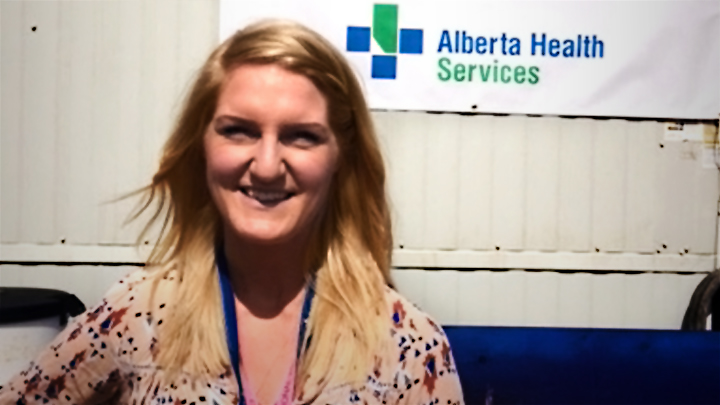
June 7, 2016
Story by Erika Sherk; Photo by Christi Retson-Spalding
Stress, worry, sadness, grief – people often experience a gamut of emotions after a natural disaster. From kids to seniors, it’s not an easy thing for anyone to experience.
It’s a time when mental health supports are crucial and Alberta Health Services (AHS) teams have been busy providing them to the residents of Fort McMurray, who have begun to return to their city after a mandatory evacuation due to wildfire on May 3.
“Going through a disaster is a life-changing event no matter the circumstances you return to,” says Marjorie Epp, AHS Clinical Supervisor, Community Mental Health, who is also a local resident.
“We’ve already seen significant grief and loss. Some people are coming back to reminders of a very frightening evacuation experience,” she says. “Some are experiencing anxiety in terms of ‘where do I begin to get the basics in place, get my house cleaned or deal with insurance people?’”
It’s normal to be going through intense emotions upon returning to Fort McMurray, she says. “With enough support – which we do have here – most people recover well from an experience such as this.”
The goal is to make sure that happens.
Rebecca Thompson, Mental Health Recovery Worker, Assertive Outreach Services team, is also a Fort McMurray resident. When she returned home on May 30, she resumed work, now in an ATCO trailer set up at the Syncrude Sports & Wellness Centre.
“We are trying to be proactive in connecting with the community to make sure everyone has the supports in place,” she says. “We want to provide support to those people who are experiencing the fallout that can come after a traumatic event.”
Since Thompson’s return, she’s been busy reconnecting with her regular clients.
It’s important to support people with pre-existing mental health conditions right now, she says. “It’s been a really stressful time so that added stress can potentially trigger more symptoms of feeling anxiety or feeling more depressed than normal.”
However, some of her clients have surprised her. “One client said his anxiety has been less than he expected, so he was thankful for that. Another who is very change-averse has risen to the occasion and been able to work at a different location than he’s used to.”
It’s impossible to guess how someone will react after a traumatic event, says Thompson. “Most adults will come out of this strong and resilient. For some, their existing coping skills will pull them through, and others will benefit from added support and that’s what we’re here for.”
The Assertive Outreach team is just one piece of the puzzle. Teams have been stationed at every information centre, using Psychological First Aid (PFA) and providing one-on-one counselling when necessary.
“They are mingling with the people and checking in: how are you doing, how are you sleeping, asking general questions to engage them and find out if they need support,” says Debra Morrison, Director, Addictions and Mental Health, North Zone - West.
Out in the community, roving wellness teams are on the move. Initially focusing on first responders, now they are connecting with the community in general, using PFA to engage and support the public. Mental Health staff are also based at the Northern Lights Regional Health Centre’s Emergency Department and Urgent Care Centre. The coverage is extensive and will remain so for as long as necessary.
“We expect mental health services will change as we go,” says Thompson. “The effects of the trauma and the changes will affect people at different times and at varying degrees over the next few months and years. We’re here for the long haul and we’re ready to help.”
For more information about mental health supports or current health services in Fort McMurray please visit http://www.albertahealthservices.ca/news/page13075.aspx.

Rebecca Thompson stands outside her current office – an ATCO trailer.